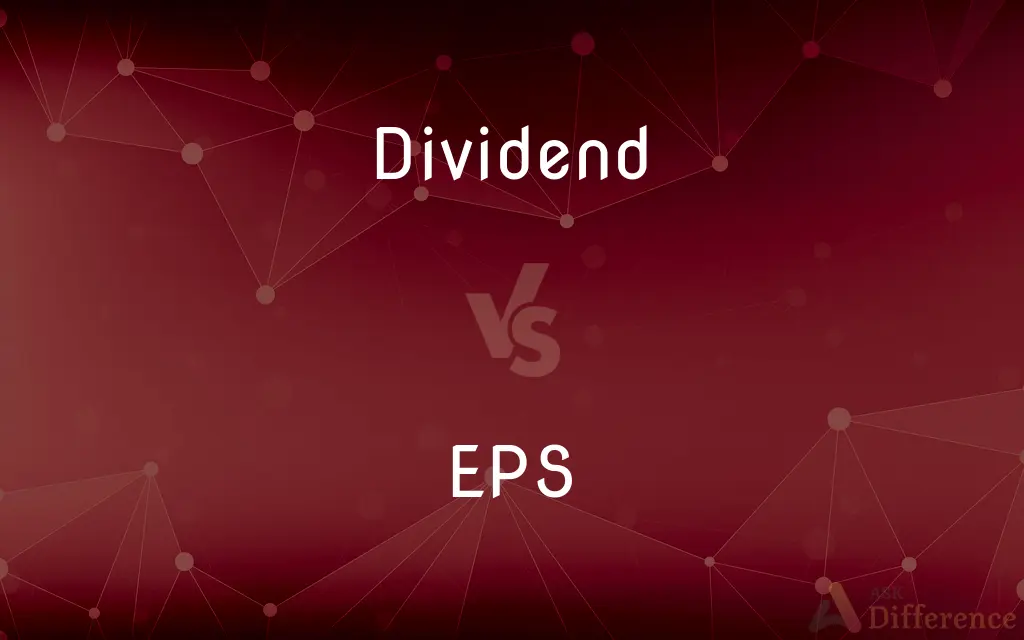Dividend vs. EPS — What's the Difference?
By Tayyaba Rehman — Published on October 13, 2023
Dividend is a portion of a company’s earnings distributed to shareholders, while EPS (Earnings Per Share) indicates the company's profitability per outstanding share of common stock.

Difference Between Dividend and EPS
Table of Contents
ADVERTISEMENT
Key Differences
A Dividend is essentially a payment made by a corporation to its shareholders, usually in the form of cash or additional shares. These dividends, which can be issued in various formats such as cash payment, stocks or any other form, represent a share of profits and retained earnings that a company reallocates. On the other side, EPS (Earnings Per Share) is a metric that represents a portion of a company's earnings allocated to each individual outstanding share of common stock, serving as an indicator of the company’s profitability.
Talking about Dividend, this element is not mandatory for companies to distribute and can be seen as a way to share profits and foster investor loyalty. EPS, conversely, is a widely utilized metric in financial analysis and investment, where higher EPS generally indicates better profitability and financial health, with investors keenly observing EPS while making investment decisions.
Dividend policies can vary greatly among different companies and industries, with some corporations opting for higher dividend payouts as a mechanism to attract investors seeking income through their investments. On the other hand, EPS is essentially derived from the company’s net income minus any dividends on preferred stock, all divided by the outstanding shares, providing a per-share perspective of net earnings.
Often, mature and financially stable companies opt to distribute Dividends to offer tangible returns and incentivize investments. EPS, in contrast, could be positively impactful across companies of various stages, with startups or rapidly growing companies potentially having lower EPS due to reinvesting profits for expansion, yet still being attractive to investors due to growth prospects.
For Dividend payers, the management’s decision to allocate profits to investors rather than reinvesting within the company implies a strategic choice, often reflective of the company’s operational context and strategic positioning. Conversely, EPS can convey a company’s profitability independent of its dividend policy, showcasing its ability to generate profits on a per-share basis.
ADVERTISEMENT
Comparison Chart
Definition
Payment made to shareholders from profits
Net income per outstanding share
Impact on Profit
Reduces retained earnings
Indicates profitability but does not impact it
Dependability
Optional, depends on company policy
Commonly used, reliable profitability indicator
Investor Implication
May attract investors seeking income
Assessed for profitability and growth prospects
Calculation
Part of earnings allocated to each share
(Net Income - Dividends on Preferred Stock) / Average Outstanding Shares
Compare with Definitions
Dividend
A company's profit distributed to shareholders.
The board declared a Dividend of $2 per share.
EPS
A metric of profitability per each outstanding share.
A rising EPS indicated improved profitability.
Dividend
A portion of corporate earnings given to investors.
Investors appreciated the consistent Dividend payouts.
EPS
The portion of earnings allocated per common share.
Investors found the consistent EPS encouraging.
Dividend
Distribution of a portion of a firm's earnings to its shareholders.
The annual report highlighted a notable increase in the Dividend.
EPS
Represents a company's net income per share.
The quarterly report showcased a robust EPS.
Dividend
The share of profits allocated to shareholders.
The Dividend was increased to share the extraordinary profits.
EPS
A measure indicating per-share earnings of a company.
Analysts predicted a potential increase in EPS.
Dividend
(Mathematics) A quantity to be divided.
EPS
Indicates how much a company earns per outstanding share.
The impressive EPS was a positive signal to investors.
Dividend
A share of profits paid to a stockholder or to a policyholder in a mutual insurance society.
EPS
Plural of ep
Dividend
A payment pro rata to a creditor of a person adjudged bankrupt.
Dividend
A share of a surplus; a bonus.
Dividend
An unexpected gain, benefit, or advantage.
Dividend
(finance) A cash payment of money by a company to its shareholders, usually made periodically (e.g., quarterly or annually).
Dividend
(arithmetic) A number or expression that is to be divided by another.
In "42 ÷ 3" the dividend is the 42.
Dividend
(figuratively) Beneficial results from a metaphorical investment (of time, effort, etc.)
His 10,000 hours of practice and recitals eventually paid dividends when he become first-chair violinist.
Dividend
To pay out a dividend.
Dividend
A sum of money to be divided and distributed; the share of a sum divided that falls to each individual; a distribute sum, share, or percentage; - applied to the profits as appropriated among shareholders, and to assets as apportioned among creditors; as, the dividend of a bank, a railway corporation, or a bankrupt estate.
Dividend
A number or quantity which is to be divided.
Dividend
That part of the earnings of a corporation that is distributed to its shareholders; usually paid quarterly
Dividend
A number to be divided by another number
Dividend
A bonus; something extra (especially a share of a surplus)
Dividend
Payment made to shareholders, usually as cash or stock.
The stock Dividend provided shareholders with additional shares.
Common Curiosities
Are Dividends mandatory for companies to distribute?
No, distributing Dividends is not mandatory and depends on a company's dividend policy.
What does a higher EPS indicate?
A higher EPS typically indicates better profitability and financial health of a company.
What is a Dividend?
A Dividend is a distribution of a portion of a company's earnings to its shareholders.
Can a company have a high EPS and not pay Dividends?
Yes, a company can have a high EPS and choose to reinvest profits instead of paying dividends.
Is EPS a good indicator of a company's financial health?
Yes, EPS is widely recognized as a reliable indicator of a company’s profitability per share.
How is EPS defined?
EPS, or Earnings Per Share, is a measure of a company's profitability, calculated as available net income per share of common stock.
How does Dividend distribution impact a company’s retained earnings?
Dividend distribution reduces a company’s retained earnings since it redistributes a part of profits to shareholders.
What factors influence Dividend distribution?
Factors include retained earnings, cash flow, future investment plans, and company policy.
Can Dividends be distributed as shares?
Yes, dividends can be distributed as cash, additional shares, or other assets.
Share Your Discovery

Previous Comparison
PIN Code vs. ZIP Code
Next Comparison
Formula Mass vs. Molar MassAuthor Spotlight
Written by
Tayyaba RehmanTayyaba Rehman is a distinguished writer, currently serving as a primary contributor to askdifference.com. As a researcher in semantics and etymology, Tayyaba's passion for the complexity of languages and their distinctions has found a perfect home on the platform. Tayyaba delves into the intricacies of language, distinguishing between commonly confused words and phrases, thereby providing clarity for readers worldwide.











































